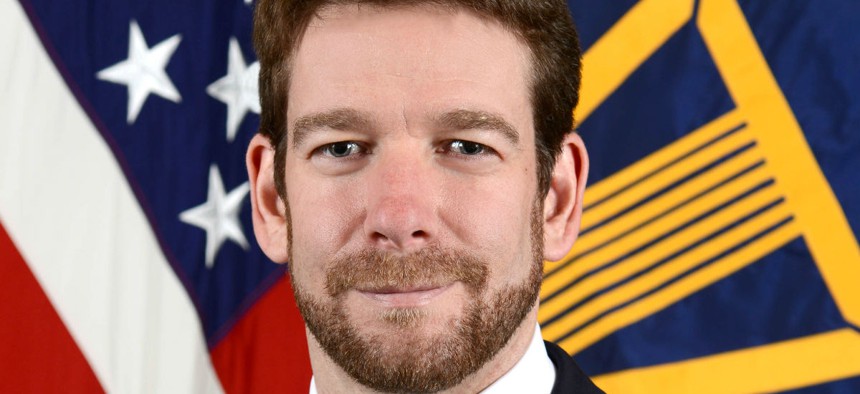
Stephen Hedger is the assistant secretary of Defense for legislative affairs. Defense Department
Pentagon’s Congressional Liaison Takes On GOP Lawmakers Over Benghazi, Email
Legislative chief Stephen Hedger challenges committee chairmen on document delivery.
After only eight months at the Defense Department, a former Capitol Hill staffer, White House aide and Army combat veteran has emerged as aggressive sparring partner with Republican committee chairmen who accuse the Obama administration of hiding documents.
Stephen Hedger, the assistant Defense secretary for legislative affairs, in recent months has exchanged strongly worded letters with Senate Judiciary Committee Chairman Chuck Grassley, R-Iowa, over whether the Pentagon adequately answered questions on Defense Secretary Ash Carter’s earlier use of private email accounts for official business.
And Hedger was implicated this Wednesday, when House Select Committee on Benghazi Chairman Trey Gowdy, R-S.C., fired off another round of criticism of “Obama administration political appointees [who] have stonewalled our requests for certain witnesses.”
Gowdy was unhappy with Hedger’s characterization of his probe of the 2012 deaths of four Americans in Libya as a "crescendo" of costly, duplicative, speculative requests, some stemming from claims made on social media or talk radio. And he accused the assistant secretary of spreading false information about his panel’s long investigation into Benghazi. Gowdy also said Hedger was taking his cues from committee Democrats, who indeed have come to his defense in their efforts to cast the Benghazi panel’s mission as a redundant partisan exercise.
Hedger, whom President Obama nominated a year ago and who was confirmed unanimously by the Senate on Oct. 8, is a West Point graduate with a law degree who, before coming aboard at the Pentagon, was special assistant to the president and the Senate liaison in the White House Office of Legislative Affairs. He spent seven years on the staff of Sen. Claire McCaskill, D-Mo., plus time with two House members.
From 1999 to 2004, Hedger served on active duty in the Army. His deployments included tours in Kosovo, Kuwait and Iraq.
In his current post, he is responsible for the Pentagon’s relationships with Congress. “He assures that Congress is fully and candidly informed of the department's plans and programs and seeks congressional support for [Defense Department] initiatives when required,” the Defense website says. “Mr. Hedger also oversees the confirmation process for individuals nominated by the president for DoD positions requiring Senate confirmation.”
Hedger’s correspondence, though detailed and businesslike, contains hints of exasperation. In telling Grassley why the Pentagon brass believe the controversy over Ash Carter’s now-discontinued use of personal email has been explained in full, he wrote: “The secretary did not and does not have a personal server. His personal email account was one he held prior to becoming secretary and is hosted by a large commercial service provider, typical of how many Americans acquire free personal email addresses.”
Responding to Gowdy’s recent requests—delivered on short notice, in the Pentagon’s view—to interview pilots heretofore not identified but who allegedly were involved in Benghazi operations, Hedger was equally firm in criticizing Gowdy’s “unrealistic” timelines:
“While we understand that investigations evolve over time, it is unfortunate that the committee has identified the need for these interviews only now. The number and continued pace of these requests since February 2016 are in tension with your staff’s statements that the committee expects to finish its investigation in the near term,” Hedger wrote. He added that there is insufficient time and information to identify the service members Gowdy seeks to interview. “Subpoenaing our service members,” he added, “when the department is working diligently to accommodate your requests and when no service member has refused to appear voluntarily, is unfair to our uniformed men and women and an unproductive way forward.”
On Wednesday, an unmoved Gowdy—who has said he hopes to release his panel’s definitive report on Benghazi this summer—wrote to Carter himself, saying that Hedger’s recent letter had been “riddled with factual inaccuracies.” He continued:
“The Select Committee is conducting a thorough, fact-centered investigation into what happened before, during, and after Benghazi, which means talking to the service members on the ground with firsthand knowledge is just as important as talking to the generals and admirals who command them,” the chairman said. “As a former federal prosecutor, I find it deeply troubling there are individuals who would like to share their stories, but have not because they are afraid of retaliation from their superiors. No one should be afraid of talking to their elected representatives in Congress,” he added, promising fair treatment of all witnesses.
“Democrats may be content to stick to their preordained conclusions,” Gowdy added, “but the committee has an obligation to determine what can and cannot be substantiated when it comes to the new witnesses we have interviewed and the new evidence we have gathered.”
In defending Hedger’s work, Benghazi committee ranking member Rep. Elijah Cummings, D-Md., said, “Ever since their disastrous 11-hour marathon hearing with Secretary Clinton backfired last fall, Republicans have been trying to redeem themselves by demanding more and more duplicative and unnecessary interviews and dragging out their sham of an investigation closer to the election. The Department of Defense has a critical job to do, which is to keep our nation safe from those who would do us harm. But Republicans continue to squander millions of taxpayer dollars chasing right-wing conspiracy theories and forcing Pentagon officials to waste their time on this partisan fishing expedition.”
Added Rep. Adam Smith, D-Wash., ranking member on the Armed Services panel, said, “After two years of a politically driven innuendo and $6.7 million in wasted taxpayer money, the last thing we should be doing is subpoenaing our service members. “It is time to shut down the Benghazi Committee and spare our men and women in uniform from this unnecessary inquisition.”
NEXT STORY: Pentagon Shakes Up Silicon Valley Outreach







